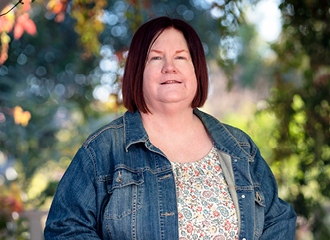Whole Health Approach Paves Veteran’s Path to Sobriety
4-minute read
Whole Health Approach Paves Veteran’s Path to Sobriety
4-minute read
Alison’s unhealthy use of alcohol contributed to the loss of her career, her marriage, and the custody of her children. Then, after having tried treatments solely for her alcohol use, the Marine Corps Veteran made a discovery that helped change the course of her life.
Health care providers at VA diagnosed Alison with not only alcohol use disorder but also posttraumatic stress disorder (PTSD) and bipolar disorder, and they began implementing a comprehensive plan to treat all her conditions. “I had a mental health problem in addition to the drinking, and they addressed both of those issues. And it was only then that I was able to see the connection, see that you couldn’t treat one without the other. You had to treat both,” Alison says.

“Each day was a new opportunity.” Veteran Reflects on Sobriety Journey
As with some Veterans, Alison experienced ups and downs as she worked on managing her challenges. But she kept making progress, and she can now declare that she’s been sober since New Year’s Day 2007 and has kept her life on a good track.
“Not every day was a good day,” she says. “I had many, many, many, many, many bad days. But each day was a new opportunity for me to do things right, do things the way I wanted to do them—to live the life that I wanted to live.”
Bad days
After serving 2 years in the Army Reserve, Alison joined the Marine Corps and experienced military sexual trauma (MST) at her first duty station in 1982. She tried to move on and act like it never happened. But when she left the Marine Corps in 1984—married and pregnant with her first child—she found the transition very difficult, and her mental health challenges mounted.
Alison felt depressed and anxious, kept her feelings bottled up, and turned to drinking to try to numb herself. “I started drinking because it was what I knew,” she says.
Her heavy alcohol use continued for years, directly costing Alison her nursing license and playing a large part in the end of her marriage, the loss of custody of her children, and a period of homelessness.
“I was very reckless when I was drinking,” Alison says. Although she didn’t recognize it at the time, symptoms of bipolar disorder and her MST-related PTSD also were contributing to her reckless behavior and a life she describes as being in “shambles.”
Losing custody of her children, Alison says, was a “wake-up call.” But finding the combination of treatments that worked for her took time.
Outpatient and residential rehab solutions
Alison says she learned a lot through outpatient treatment, including life skills such as how to manage money, build good relationships, and communicate more openly and honestly.
For Alison, however, her treatment in residential rehab had an even greater effect. As Alison describes it, receiving care 24/7 in a residential setting broke down all her defenses. “You couldn’t escape your feelings,” she says. “You couldn’t deny anymore the significance of what was happening.”
Every day in residential rehab, she went to classes, exercised, and met with a dietician, doctor, and psychiatrist. These treatments and services are part of what VA describes as its Whole Health approach.
“It’s not just one thing that’s going to work,” Alison says. “You just can’t take medication and think everything’s going to be all right. You got to look at your mental health, you got to look at what you’re eating, you got to look at what you’re doing physically—exercising or not exercising—and you got to look at what is really going on. They’re able to make that connection, and they address everything.”
Her treatment has continued to use a Whole Health approach since she left rehab. “When I go into the VA and I’m seen, they’re looking at everything: physically, mentally, psychologically, spiritually,” she says. “They put all those pieces together for you.”
Alison says her keys to sobriety include avoiding temptations to drink alcohol, connecting with her Alcoholics Anonymous group about twice a week, reaching out to her local Vet Center for help, and meeting with other Veterans.
“You have like experiences, and it feels like you’re going home,” she says of her Veteran meetups. “It feels like you’re connecting with a brother, you’re connecting with a sister, and you can share on a very intimate level what’s going on, and they understand.”
Better days
“Being sober has given me life,” Alison says. “I have very good relationships with my children. I’m proud of their success. I’m proud of how they’re living life. I think I’ve corrected a lot of the wrongs that I’ve done.”
For several years, she’s also been paying it forward as a caseworker at a nonprofit, helping people whose stories feel similar to her own.
“I get to see all those that are still seeking recovery,” she says. “They haven’t found it yet. When I talk to people, I can tell them my story and just pray that they can reach out and get connected somehow, some way. … You just have to reach out and grab life.”
